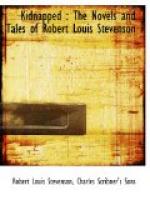By what I have read in books, I think few that have held a pen were ever really wearied, or they would write of it more strongly. I had no care of my life, neither past nor future, and I scarce remembered there was such a lad as David Balfour. I did not think of myself, but just of each fresh step which I was sure would be my last, with despair—and of Alan, who was the cause of it, with hatred. Alan was in the right trade as a soldier; this is the officer’s part to make men continue to do things, they know not wherefore, and when, if the choice was offered, they would lie down where they were and be killed. And I dare say I would have made a good enough private; for in these last hours it never occurred to me that I had any choice but just to obey as long as I was able, and die obeying.
Day began to come in, after years, I thought; and by that time we were past the greatest danger, and could walk upon our feet like men, instead of crawling like brutes. But, dear heart have mercy! what a pair we must have made, going double like old grandfathers, stumbling like babes, and as white as dead folk. Never a word passed between us; each set his mouth and kept his eyes in front of him, and lifted up his foot and set it down again, like people lifting weights at a country play;* all the while, with the moorfowl crying “peep!” in the heather, and the light coming slowly clearer in the east.
* Village fair.
I say Alan did as I did. Not that ever I looked at him, for I had enough ado to keep my feet; but because it is plain he must have been as stupid with weariness as myself, and looked as little where we were going, or we should not have walked into an ambush like blind men.
It fell in this way. We were going down a heathery brae, Alan leading and I following a pace or two behind, like a fiddler and his wife; when upon a sudden the heather gave a rustle, three or four ragged men leaped out, and the next moment we were lying on our backs, each with a dirk at his throat.
I don’t think I cared; the pain of this rough handling was quite swallowed up by the pains of which I was already full; and I was too glad to have stopped walking to mind about a dirk. I lay looking up in the face of the man that held me; and I mind his face was black with the sun, and his eyes very light, but I was not afraid of him. I heard Alan and another whispering in the Gaelic; and what they said was all one to me.
Then the dirks were put up, our weapons were taken away, and we were set face to face, sitting in the heather.
“They are Cluny’s men,” said Alan. “We couldnae have fallen better. We’re just to bide here with these, which are his out-sentries, till they can get word to the chief of my arrival.”
Now Cluny Macpherson, the chief of the clan Vourich, had been one of the leaders of the great rebellion six years before; there was a price on his life; and I had supposed him long ago in France, with the rest of the heads of that desperate party. Even tired as I was, the surprise of what I heard half wakened me.




